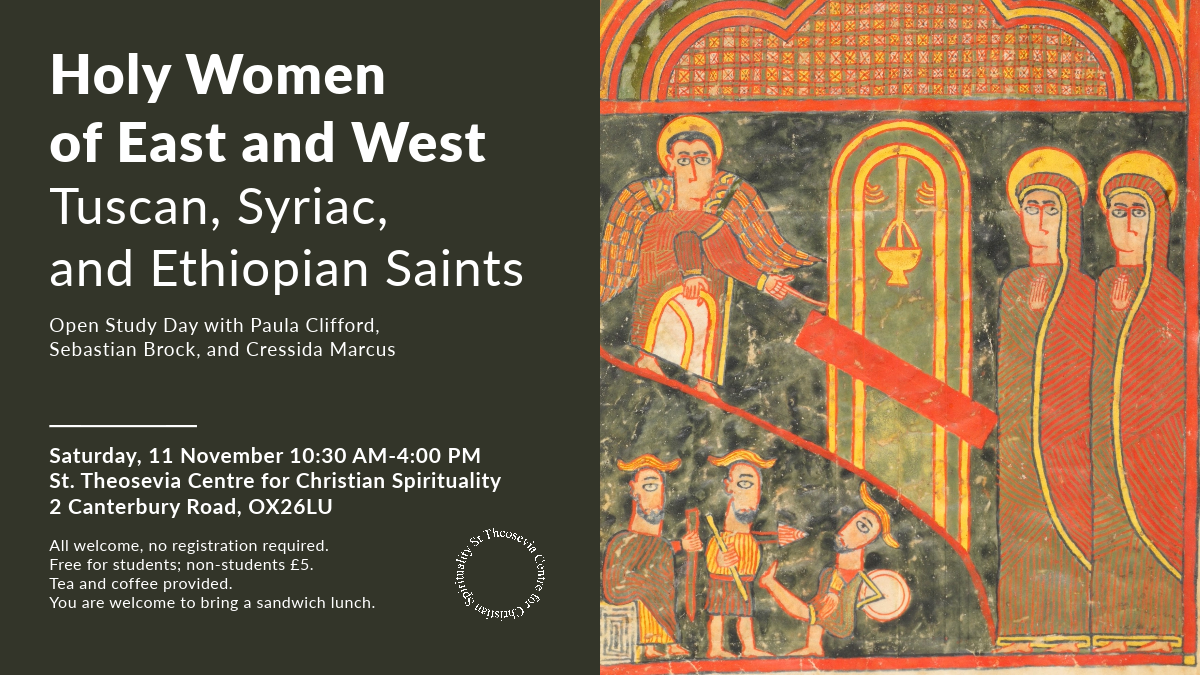Saturday 11 November 10.30 am – 4 pm
Open Study Day with Paula Clifford,
Sebastian Brock, and Cressida Marcus
All welcome, no registration required. For details of the talks see below.
Free for students; non-students £5. Tea and coffee provided.
You are welcome to bring a sandwich lunch.
Dr Sebastian Brock: ‘Some holy women from the Syriac Orient’.
Dr Sebastian Brock, a Trustee of St Theosevia’s, was for many years Reader in Syriac Studies in Oxford. He is a leading expert in Classical Syriac language and literature, and on the history of Syriac Christianity. Sebastian promises that: “I shall select five or six holy women ranging in date from the second century BC [sic!] to the present day.”
Dr Paula Clifford: Tuscany’s Noble Treasures:
Conceptualizing female religious life in medieval Italy
Raymond of Capua, the 14th-century Dominican, author of the life of St Agnes of Montepulciano, wrote: “Let all of Tuscany exalt because it has been decorated with such a noble treasure.” So, who was Agnes? And who were the other women — Umilità of Faenza, Margaret of Cortona, Angela of Foligno, Clare of Montefalco, Catherine of Siena — who graced mediaeval Tuscany? Why so many — and why just there? Rev Dr Paula Clifford, one time lecturer in Medieval Studies, now a priest in the diocese of Oxford, shares the answers she found in writing her recent book.
Dr Cressida Marcus: The Ordinary and Extraordinary in Orthodoxy:
Women, Female Saints, and the Female Element in the Ethiopian Orthodox Tewahedo Tradition
Anthropologist Cressida Marcus has spent decades studying the Ethiopian Orthodox Tewahedo Church tradition
and faith community.
The paper begins by comparing details from mediaeval hagiographies of the very few sainted women of the Ethiopian Orthodox Church with the lives of contemporary orthodox women. Cressida enquires what makes these holy figures Ethiopian? She then develops, reviews, and critiques the current state of knowledge about gender, sexuality, and piety in the Ethiopian Orthodox context.
In recent academic debate on the Ethiopian female saints, Professor Wendy Belcher (Princeton) has seen same-sex intimacies as primarily homoerotic, a viewpoint that sits uncomfortably beside the present posturing around homosexuality in Africa. Instead, through immersion and empathy, the socio-cultural anthropologist gains a cultural intimacy and so can relay a different perspective of cooperation, sisterhood, and Christian love that includes and embraces sexuality. The fertility of women is a shared power, a somatic and spiritual bridge to Mary, the Mediatrix. The African centrality of fertility, and matrifocality, is conceived as an integral female element in Ethiopian Orthodox Christianity. The speaker, in counterpoint, joins in the conversation by championing the female voice, as an anthropologist who knows both Academia and the field.
An annual veneration of the fifteenth-century saint Kristos Samra, one of the few whose life is well known, takes place off the shores of Lake Tana. On pilgrimage there, one encounters shared sisterhood and amity, piety and veneration. The presentation includes slides which reveal the vernacular proximity of ordinary women to the sacred, illustrating in their piety, bodily choreography, and prayers. Remembering that women are often the majority of churchgoers, theoretical and empirical insight will develop the female dimension in the everyday as well as for sites of female veneration.
This paper counters received opinions about gender – primarily that orthodox patrimony is solely male dominated – by thinking about the culturally encoded significance of female sexuality.
